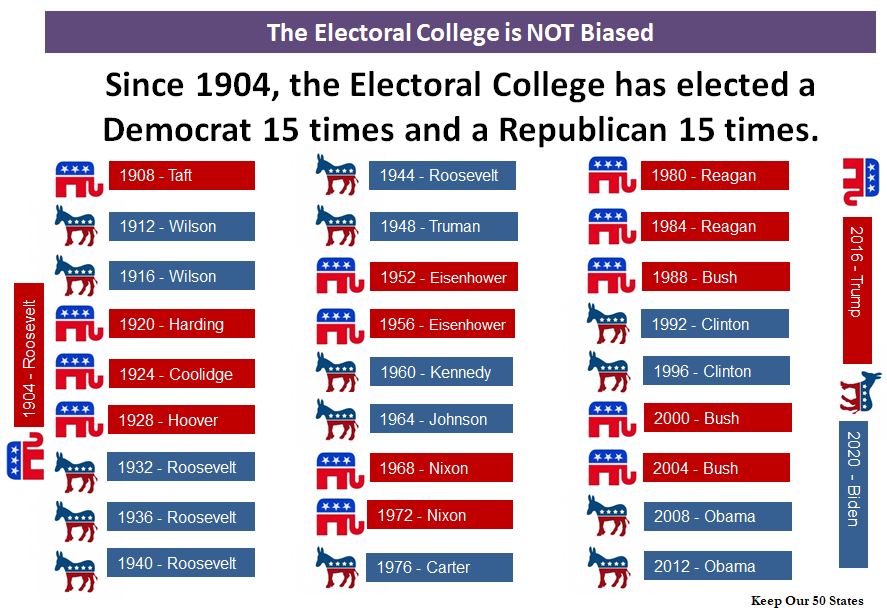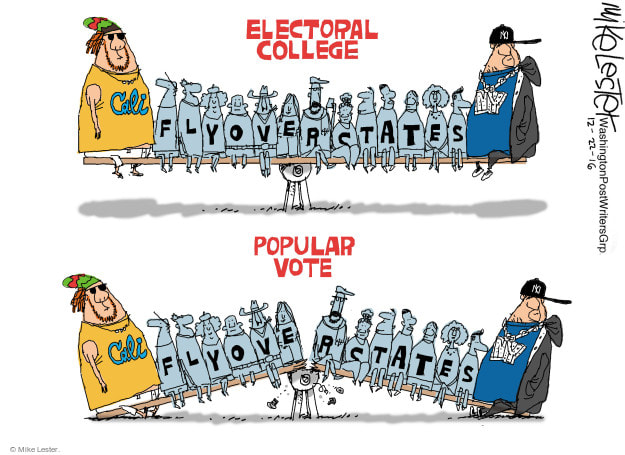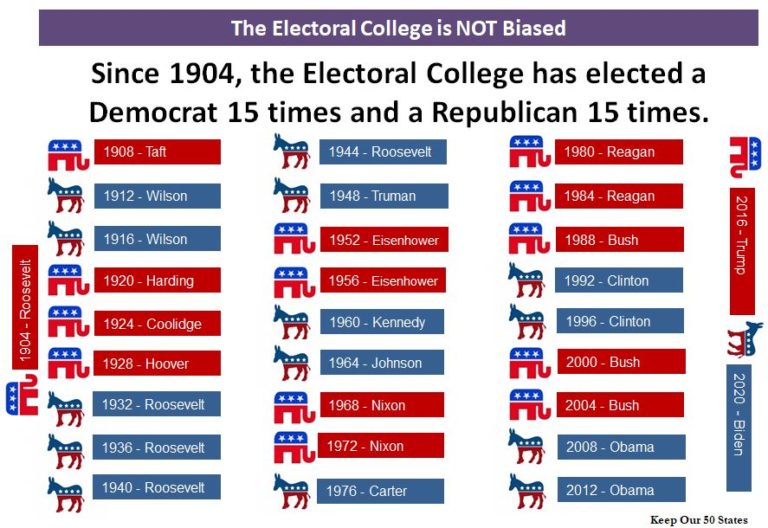Hard to Argue With Vagueness
In Iowa’s Gazette, one John Hendrickson has an editorial on the importance of preserving the Electoral College, as opposed to electing the president by popular vote. So let’s see what his reasons are.
He starts out with a few paragraphs that use words like “attack”, “elimination”, “undermine” to create a vague feeling that something bad will happen if the Electoral College is eliminated, without actually making anything that could be considered an argument.
He eventually gets to
When the Founding Fathers met in Philadelphia in 1787, our Constitution created a republican form of governance that limited the powers of the federal government. In Federalist Paper 45 James Madison wrote: “The powers delegated by the proposed Constitution to the federal government are few and defined. Those which are to remain in the State governments are numerous and indefinite.” The 10th Amendment further solidified what Madison wrote in Federalist 45. Historian Allen Guelzo correctly points out that the “Constitution never set out to create a streamlined national government.”
Hearkening back to the founding of the nation is very much on-brand. The revolutionary period is seen by many as a golden age, when a perfect constitution leapt, Athena-like, from the founders’ collective brow. Even a cursory glance at American history will belie this simplistic story, or even the first ten amendments: a bunch of states wouldn’t join the union unless the constitution were first amended.
Beyond that, Hendrickson still isn’t making much of an argument: he implies that the National Popular Vote movement somehow wants to give to the federal government powers that were properly given to the states, but doesn’t spell out what these powers are, or how they would be taken away. If the National Popular Vote Interstate Compact passes, elections will still be conducted by the states, the same way as before. In fact, the compact relies on the fact that each state can conduct elections however it wants to, including taking into account the way other states vote, if it wants to.
Hendrickson continues:
The American Founders did not wish the states to have a diminished role under the Constitution. The late constitutional scholar James McClellan wrote that the “entire Constitution is actually honeycombed with provisions designed to protect the residual sovereignty and interests of the states and to give them influence in the decision-making process at the national level.”
This certainly includes the Electoral College. In considering the election of the executive, the Founders rejected outright a direct, national election. In designing the Electoral College, the Founders wanted to ensure that the selection of the executive was independent of Congress and included the states; the Electoral College was designed to protect the interests of the states and the people.
Again, there’s lots of handwaving, but very little by way of actual argument. “[T]he Founders rejected outright a direct, national election.” Well, yes; the Electoral College was a compromise toget states like Virginia to join the union: Virginia hada lot of slaves, but comparatively few voters, and the Electoral College gave itmore influence in presidential elections than it would otherwise have.
But the mere fact that the founders set things up a certain way is no reason to keep them that way. Back in 1789, different states might as well have been different countries. Today, you can easily send money from a bank in Maryland to order something from a company in Connecticut (whose headquarters are in Delaware), and have it shipped from Georgia. Heck, Oklahoma currently has the same population as the entire country did in 1789. Times are different. If we’re going to quote the founders, how about Thomas Jefferson?
“I am not an advocate for frequent changes in laws and constitutions, but laws and institutions must go hand in hand with the progress of the human mind. As that becomes more developed, more enlightened, as new discoveries are made, new truths discovered and manners and opinions change, with the change of circumstances, institutions must advance also to keep pace with the times. We might as well require a man to wear still the coat which fitted him when a boy as civilized society to remain ever under the regimen of their barbarous ancestors.”
Hendrickson also writes, “the Founders wanted to ensure that the selection of the executive was independent of Congress and included the states”. Again, this is just vague threats. He doesn’t say how Congress would be involved in presidential elections, or how states would be excluded; he just throws that out as a vague threat.
Americans need to understand the importance of federalism to our constitutional republic. Federalism is as essential as separation of powers and checks and balances, allowing the states to maintain a level of sovereignty from the federal government. The Electoral College is the final “Rock of Gibraltar defense of federalism. “Federalism is in the bones of our nation and abolishing the Electoral College would point toward doing away with the entire federal system,” argues Guelzo.
Here, Hendrickson seems to be making some kind of slippery-slope argument, that electing the president by popular vote will somehow erode the separation of powers and, I don’t know, lead to autocratic rule or something. I’d like to avoid autocratic rule, and I’d be interested in how Hendrickson thinks this slow erosion might happen, if it weren’t for the fact that our Capitol was attacked a year and a half ago by a mob trying to undermine democracy and install an autocrat.
If the Electoral College was eliminated, Iowa would be ignored by presidential candidates and the voices of Iowans would be drowned out as elections would be decided by large urban centers.
Finally, we get to an actual pair of arguments. They’re stupid, but they’re still arguments: 1) if it weren’t for the Electoral College, candidates would ignore Iowa and Iowans’ concerns, and 2) the outcome of the election would be decided solely by big cities.
I’ve dispensed with (2) elsewhere. As for (1), the reason political campaigns pay attention to Iowa isn’t the Electoral College; it’s the fact that it has the first presidential caucuses. So there’s symbolism in winning the Iowa caucuses. It gives the winning candidates a morale boost. Beyond that, once the candidates are finally chosen, no one gives a shit. Iowa is a red state, one of those that the networks call on election night as soon as they’re legally allowed to. The Democrats write it off, and Republicans take it for granted. Getting rid of the Electoral College might actually help with that.
The fact that supporters of the Electoral College feel the need to write this sort of column is telling. If they had any solid arguments, they’d trot them out. Instead, we get this wishy-washy appeal to tradition and fear of change.



